Reflective Personal Development Report and Plan
VerifiedAdded on 2024/06/28
|19
|4116
|454
AI Summary
This report explores the importance of self-assessment in career development. It examines four key skills: teamwork, public speaking, time management, and negotiation. Through reflective journal entries, the author analyzes their strengths and weaknesses in each area, identifying areas for improvement. The report concludes with a personal development plan outlining specific, measurable, attainable, relevant, and time-bound goals for enhancing these skills.
Contribute Materials
Your contribution can guide someone’s learning journey. Share your
documents today.
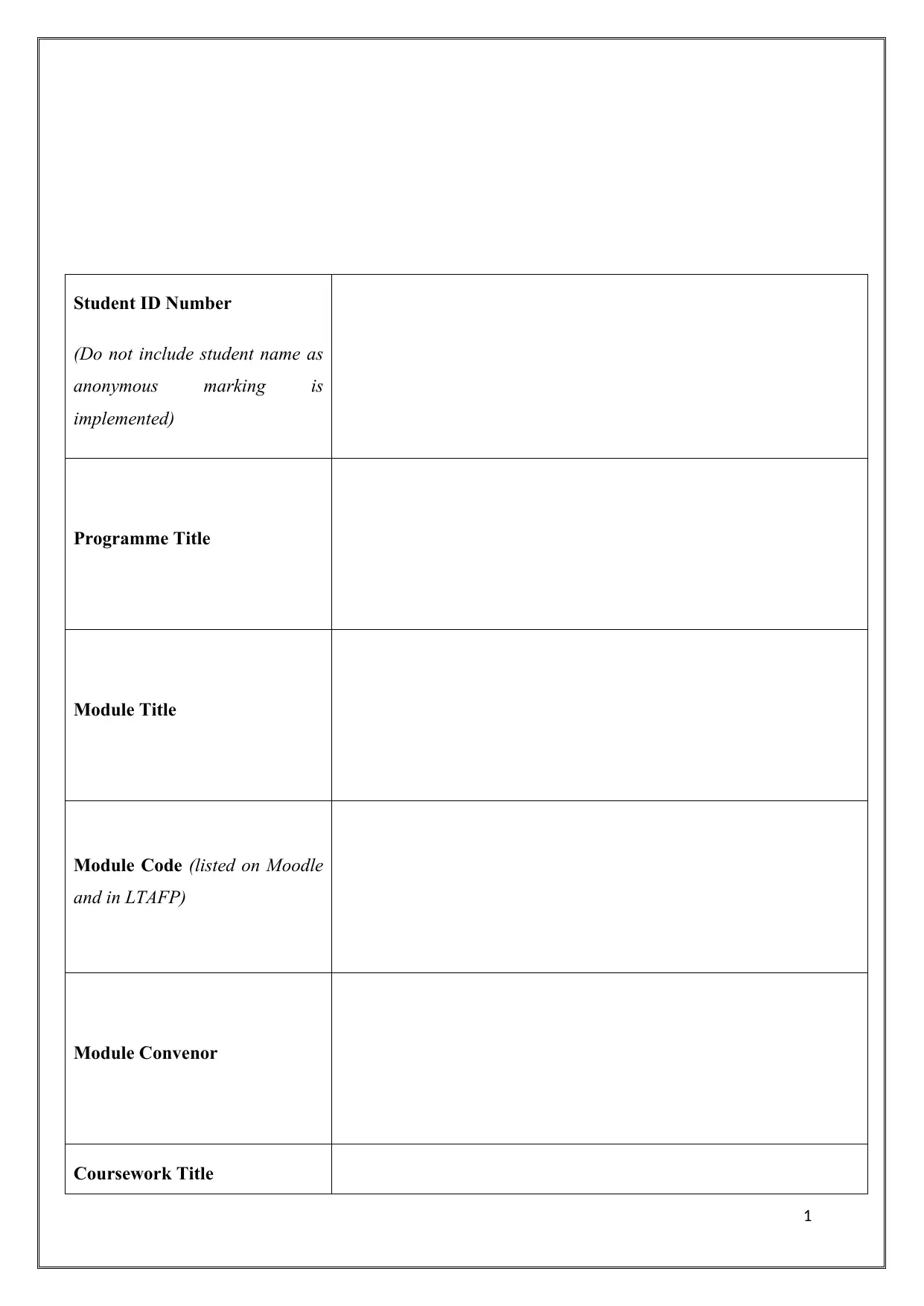
Student ID Number
(Do not include student name as
anonymous marking is
implemented)
Programme Title
Module Title
Module Code (listed on Moodle
and in LTAFP)
Module Convenor
Coursework Title
1
(Do not include student name as
anonymous marking is
implemented)
Programme Title
Module Title
Module Code (listed on Moodle
and in LTAFP)
Module Convenor
Coursework Title
1
Secure Best Marks with AI Grader
Need help grading? Try our AI Grader for instant feedback on your assignments.
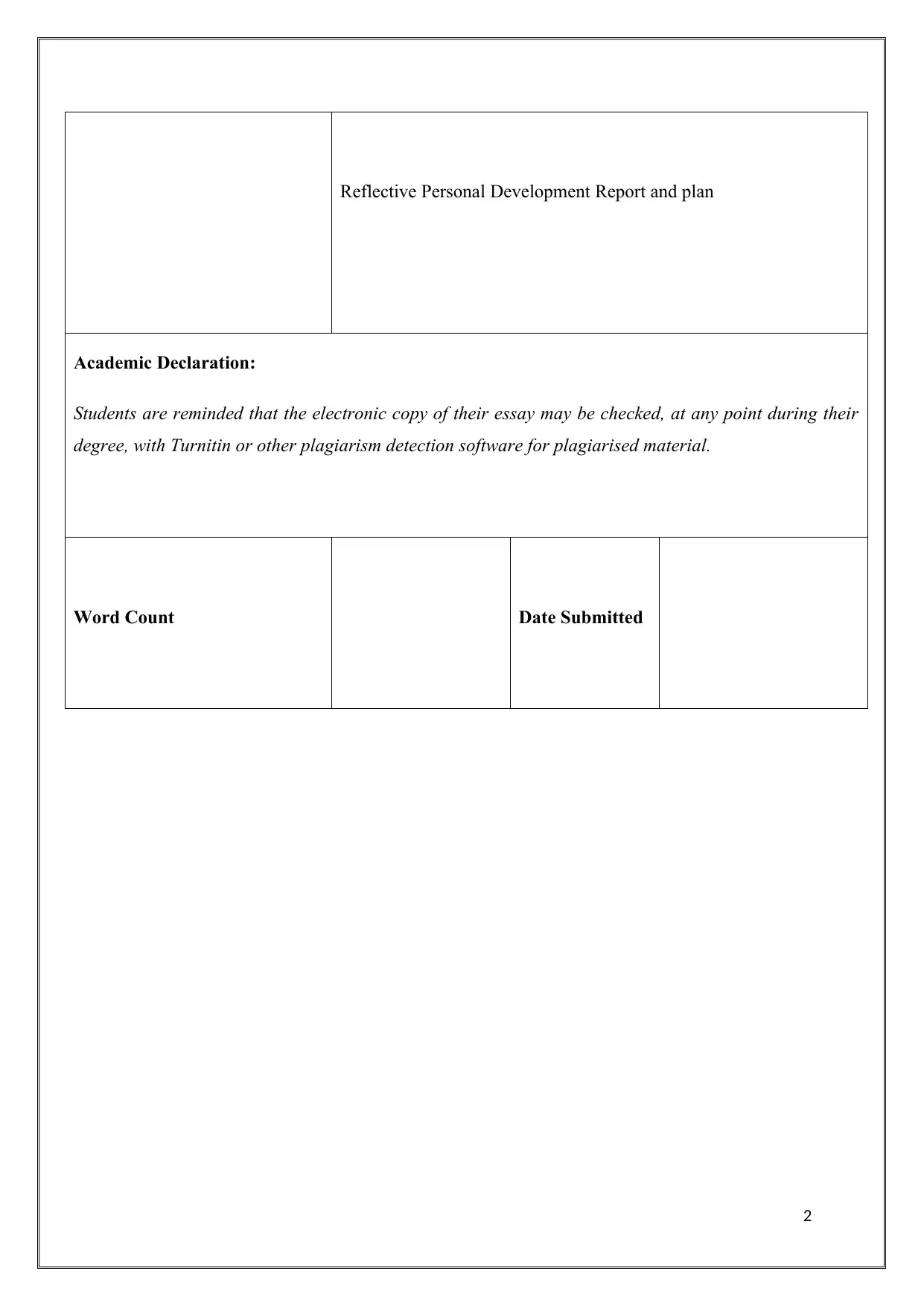
Reflective Personal Development Report and plan
Academic Declaration:
Students are reminded that the electronic copy of their essay may be checked, at any point during their
degree, with Turnitin or other plagiarism detection software for plagiarised material.
Word Count Date Submitted
2
Academic Declaration:
Students are reminded that the electronic copy of their essay may be checked, at any point during their
degree, with Turnitin or other plagiarism detection software for plagiarised material.
Word Count Date Submitted
2
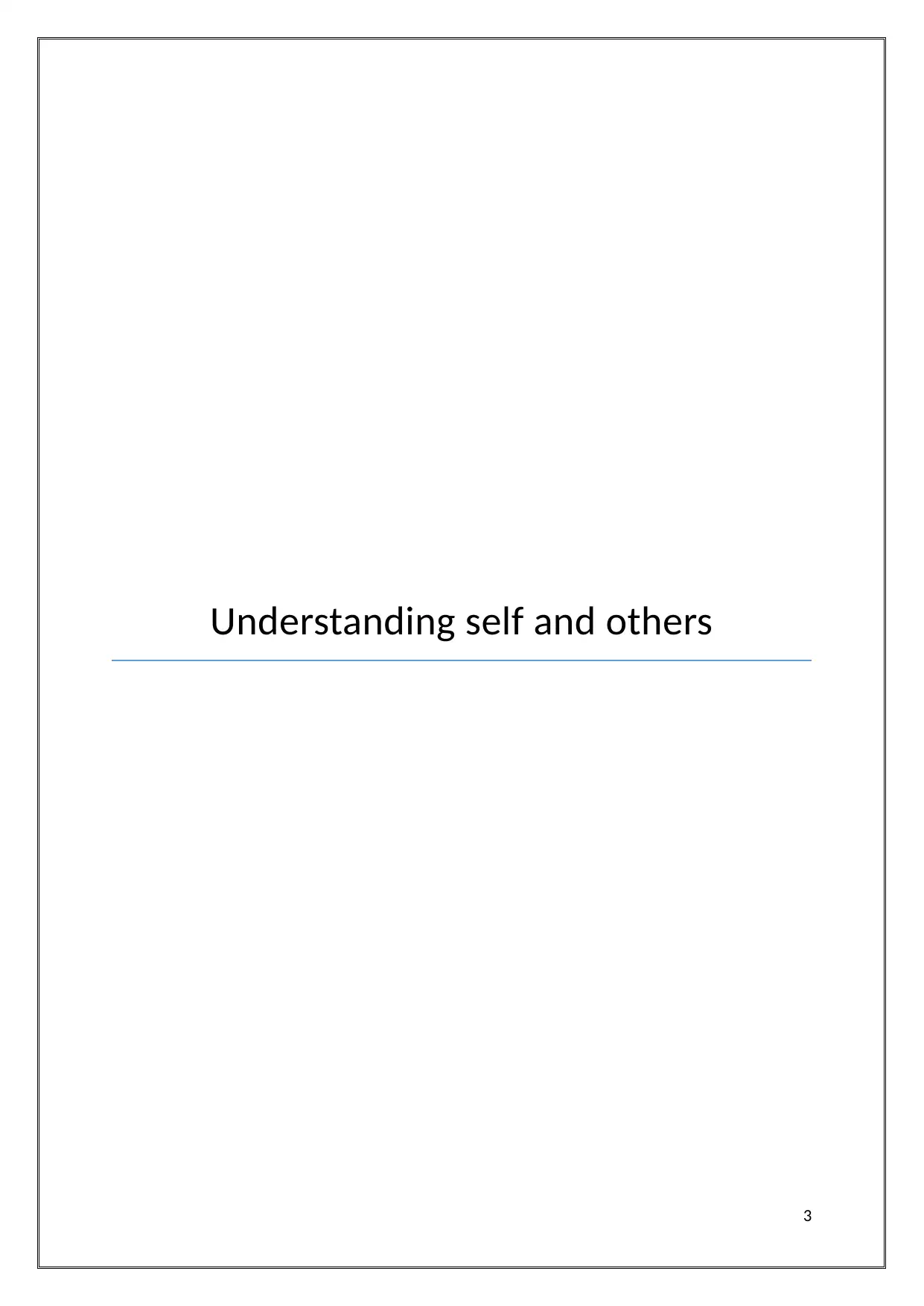
Understanding self and others
3
3
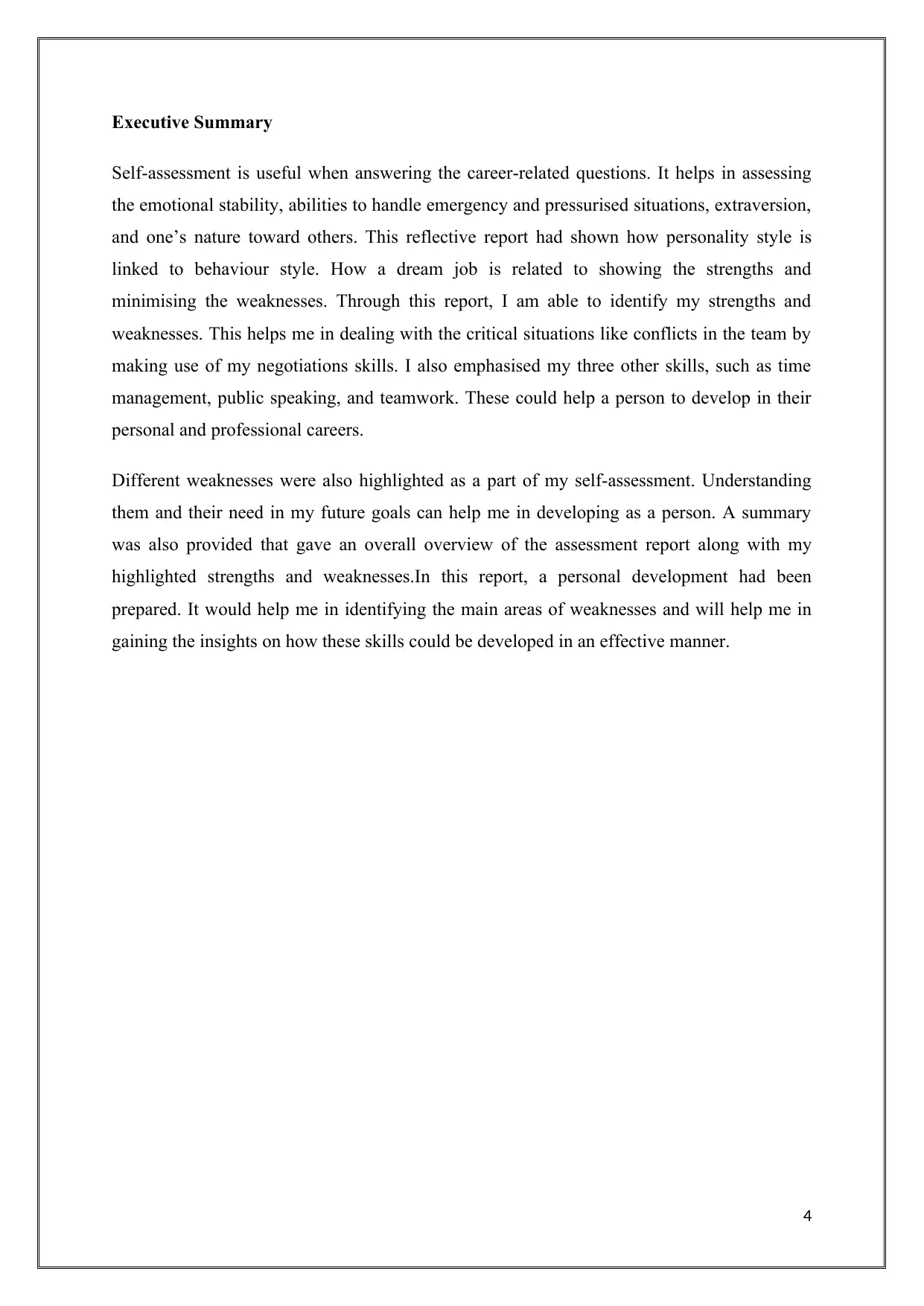
Executive Summary
Self-assessment is useful when answering the career-related questions. It helps in assessing
the emotional stability, abilities to handle emergency and pressurised situations, extraversion,
and one’s nature toward others. This reflective report had shown how personality style is
linked to behaviour style. How a dream job is related to showing the strengths and
minimising the weaknesses. Through this report, I am able to identify my strengths and
weaknesses. This helps me in dealing with the critical situations like conflicts in the team by
making use of my negotiations skills. I also emphasised my three other skills, such as time
management, public speaking, and teamwork. These could help a person to develop in their
personal and professional careers.
Different weaknesses were also highlighted as a part of my self-assessment. Understanding
them and their need in my future goals can help me in developing as a person. A summary
was also provided that gave an overall overview of the assessment report along with my
highlighted strengths and weaknesses.In this report, a personal development had been
prepared. It would help me in identifying the main areas of weaknesses and will help me in
gaining the insights on how these skills could be developed in an effective manner.
4
Self-assessment is useful when answering the career-related questions. It helps in assessing
the emotional stability, abilities to handle emergency and pressurised situations, extraversion,
and one’s nature toward others. This reflective report had shown how personality style is
linked to behaviour style. How a dream job is related to showing the strengths and
minimising the weaknesses. Through this report, I am able to identify my strengths and
weaknesses. This helps me in dealing with the critical situations like conflicts in the team by
making use of my negotiations skills. I also emphasised my three other skills, such as time
management, public speaking, and teamwork. These could help a person to develop in their
personal and professional careers.
Different weaknesses were also highlighted as a part of my self-assessment. Understanding
them and their need in my future goals can help me in developing as a person. A summary
was also provided that gave an overall overview of the assessment report along with my
highlighted strengths and weaknesses.In this report, a personal development had been
prepared. It would help me in identifying the main areas of weaknesses and will help me in
gaining the insights on how these skills could be developed in an effective manner.
4
Secure Best Marks with AI Grader
Need help grading? Try our AI Grader for instant feedback on your assignments.
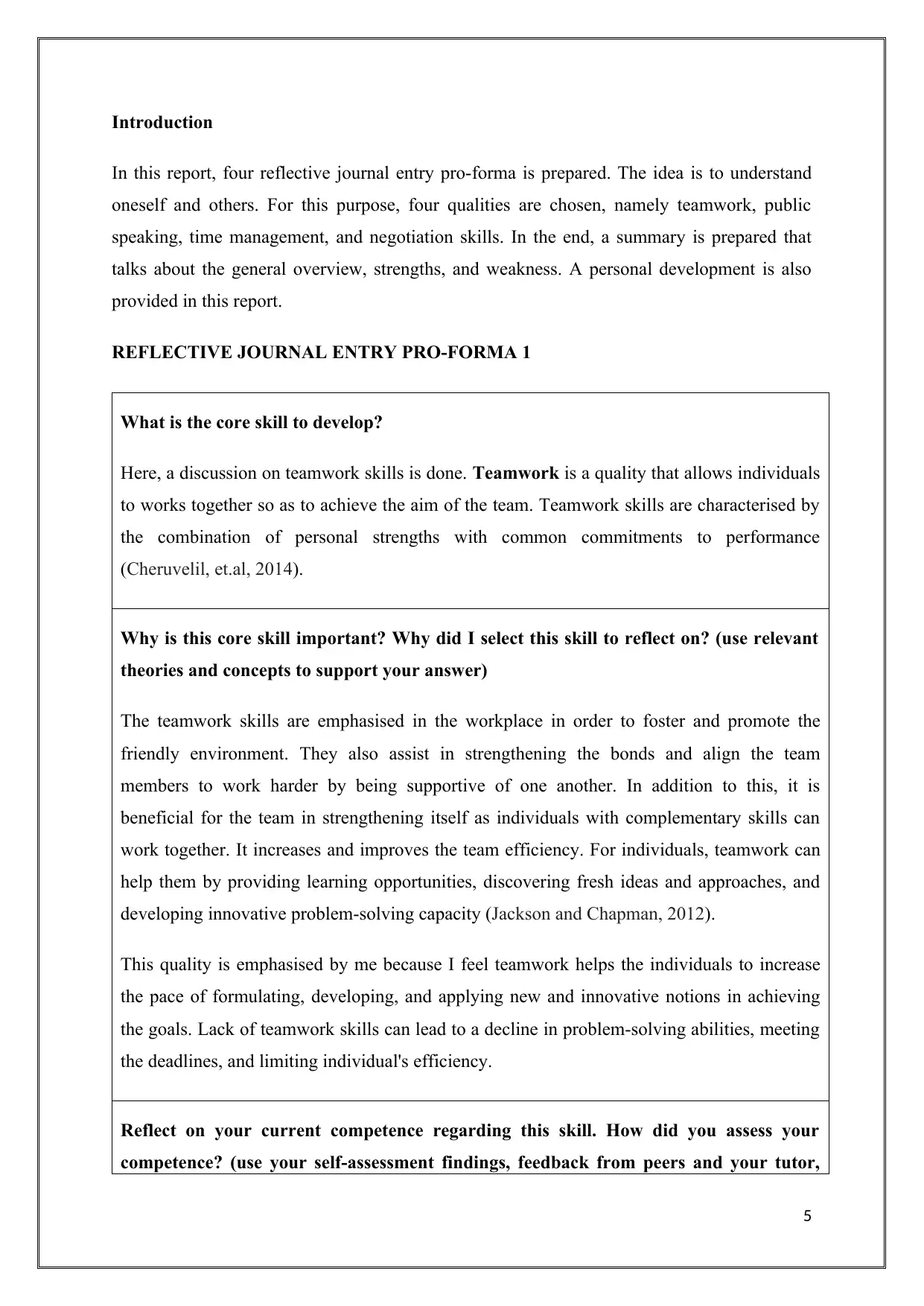
Introduction
In this report, four reflective journal entry pro-forma is prepared. The idea is to understand
oneself and others. For this purpose, four qualities are chosen, namely teamwork, public
speaking, time management, and negotiation skills. In the end, a summary is prepared that
talks about the general overview, strengths, and weakness. A personal development is also
provided in this report.
REFLECTIVE JOURNAL ENTRY PRO-FORMA 1
What is the core skill to develop?
Here, a discussion on teamwork skills is done. Teamwork is a quality that allows individuals
to works together so as to achieve the aim of the team. Teamwork skills are characterised by
the combination of personal strengths with common commitments to performance
(Cheruvelil, et.al, 2014).
Why is this core skill important? Why did I select this skill to reflect on? (use relevant
theories and concepts to support your answer)
The teamwork skills are emphasised in the workplace in order to foster and promote the
friendly environment. They also assist in strengthening the bonds and align the team
members to work harder by being supportive of one another. In addition to this, it is
beneficial for the team in strengthening itself as individuals with complementary skills can
work together. It increases and improves the team efficiency. For individuals, teamwork can
help them by providing learning opportunities, discovering fresh ideas and approaches, and
developing innovative problem-solving capacity (Jackson and Chapman, 2012).
This quality is emphasised by me because I feel teamwork helps the individuals to increase
the pace of formulating, developing, and applying new and innovative notions in achieving
the goals. Lack of teamwork skills can lead to a decline in problem-solving abilities, meeting
the deadlines, and limiting individual's efficiency.
Reflect on your current competence regarding this skill. How did you assess your
competence? (use your self-assessment findings, feedback from peers and your tutor,
5
In this report, four reflective journal entry pro-forma is prepared. The idea is to understand
oneself and others. For this purpose, four qualities are chosen, namely teamwork, public
speaking, time management, and negotiation skills. In the end, a summary is prepared that
talks about the general overview, strengths, and weakness. A personal development is also
provided in this report.
REFLECTIVE JOURNAL ENTRY PRO-FORMA 1
What is the core skill to develop?
Here, a discussion on teamwork skills is done. Teamwork is a quality that allows individuals
to works together so as to achieve the aim of the team. Teamwork skills are characterised by
the combination of personal strengths with common commitments to performance
(Cheruvelil, et.al, 2014).
Why is this core skill important? Why did I select this skill to reflect on? (use relevant
theories and concepts to support your answer)
The teamwork skills are emphasised in the workplace in order to foster and promote the
friendly environment. They also assist in strengthening the bonds and align the team
members to work harder by being supportive of one another. In addition to this, it is
beneficial for the team in strengthening itself as individuals with complementary skills can
work together. It increases and improves the team efficiency. For individuals, teamwork can
help them by providing learning opportunities, discovering fresh ideas and approaches, and
developing innovative problem-solving capacity (Jackson and Chapman, 2012).
This quality is emphasised by me because I feel teamwork helps the individuals to increase
the pace of formulating, developing, and applying new and innovative notions in achieving
the goals. Lack of teamwork skills can lead to a decline in problem-solving abilities, meeting
the deadlines, and limiting individual's efficiency.
Reflect on your current competence regarding this skill. How did you assess your
competence? (use your self-assessment findings, feedback from peers and your tutor,
5
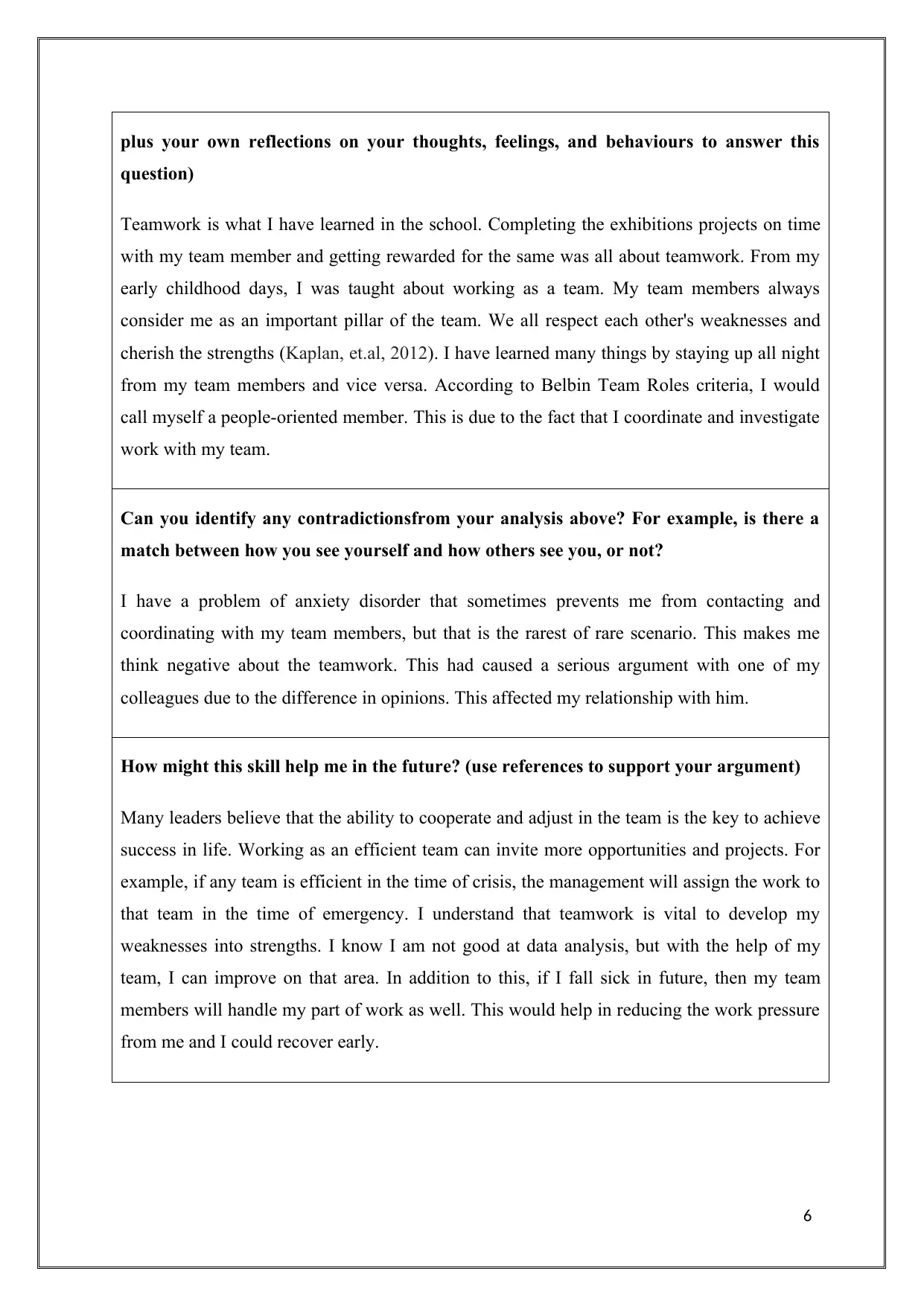
plus your own reflections on your thoughts, feelings, and behaviours to answer this
question)
Teamwork is what I have learned in the school. Completing the exhibitions projects on time
with my team member and getting rewarded for the same was all about teamwork. From my
early childhood days, I was taught about working as a team. My team members always
consider me as an important pillar of the team. We all respect each other's weaknesses and
cherish the strengths (Kaplan, et.al, 2012). I have learned many things by staying up all night
from my team members and vice versa. According to Belbin Team Roles criteria, I would
call myself a people-oriented member. This is due to the fact that I coordinate and investigate
work with my team.
Can you identify any contradictionsfrom your analysis above? For example, is there a
match between how you see yourself and how others see you, or not?
I have a problem of anxiety disorder that sometimes prevents me from contacting and
coordinating with my team members, but that is the rarest of rare scenario. This makes me
think negative about the teamwork. This had caused a serious argument with one of my
colleagues due to the difference in opinions. This affected my relationship with him.
How might this skill help me in the future? (use references to support your argument)
Many leaders believe that the ability to cooperate and adjust in the team is the key to achieve
success in life. Working as an efficient team can invite more opportunities and projects. For
example, if any team is efficient in the time of crisis, the management will assign the work to
that team in the time of emergency. I understand that teamwork is vital to develop my
weaknesses into strengths. I know I am not good at data analysis, but with the help of my
team, I can improve on that area. In addition to this, if I fall sick in future, then my team
members will handle my part of work as well. This would help in reducing the work pressure
from me and I could recover early.
6
question)
Teamwork is what I have learned in the school. Completing the exhibitions projects on time
with my team member and getting rewarded for the same was all about teamwork. From my
early childhood days, I was taught about working as a team. My team members always
consider me as an important pillar of the team. We all respect each other's weaknesses and
cherish the strengths (Kaplan, et.al, 2012). I have learned many things by staying up all night
from my team members and vice versa. According to Belbin Team Roles criteria, I would
call myself a people-oriented member. This is due to the fact that I coordinate and investigate
work with my team.
Can you identify any contradictionsfrom your analysis above? For example, is there a
match between how you see yourself and how others see you, or not?
I have a problem of anxiety disorder that sometimes prevents me from contacting and
coordinating with my team members, but that is the rarest of rare scenario. This makes me
think negative about the teamwork. This had caused a serious argument with one of my
colleagues due to the difference in opinions. This affected my relationship with him.
How might this skill help me in the future? (use references to support your argument)
Many leaders believe that the ability to cooperate and adjust in the team is the key to achieve
success in life. Working as an efficient team can invite more opportunities and projects. For
example, if any team is efficient in the time of crisis, the management will assign the work to
that team in the time of emergency. I understand that teamwork is vital to develop my
weaknesses into strengths. I know I am not good at data analysis, but with the help of my
team, I can improve on that area. In addition to this, if I fall sick in future, then my team
members will handle my part of work as well. This would help in reducing the work pressure
from me and I could recover early.
6
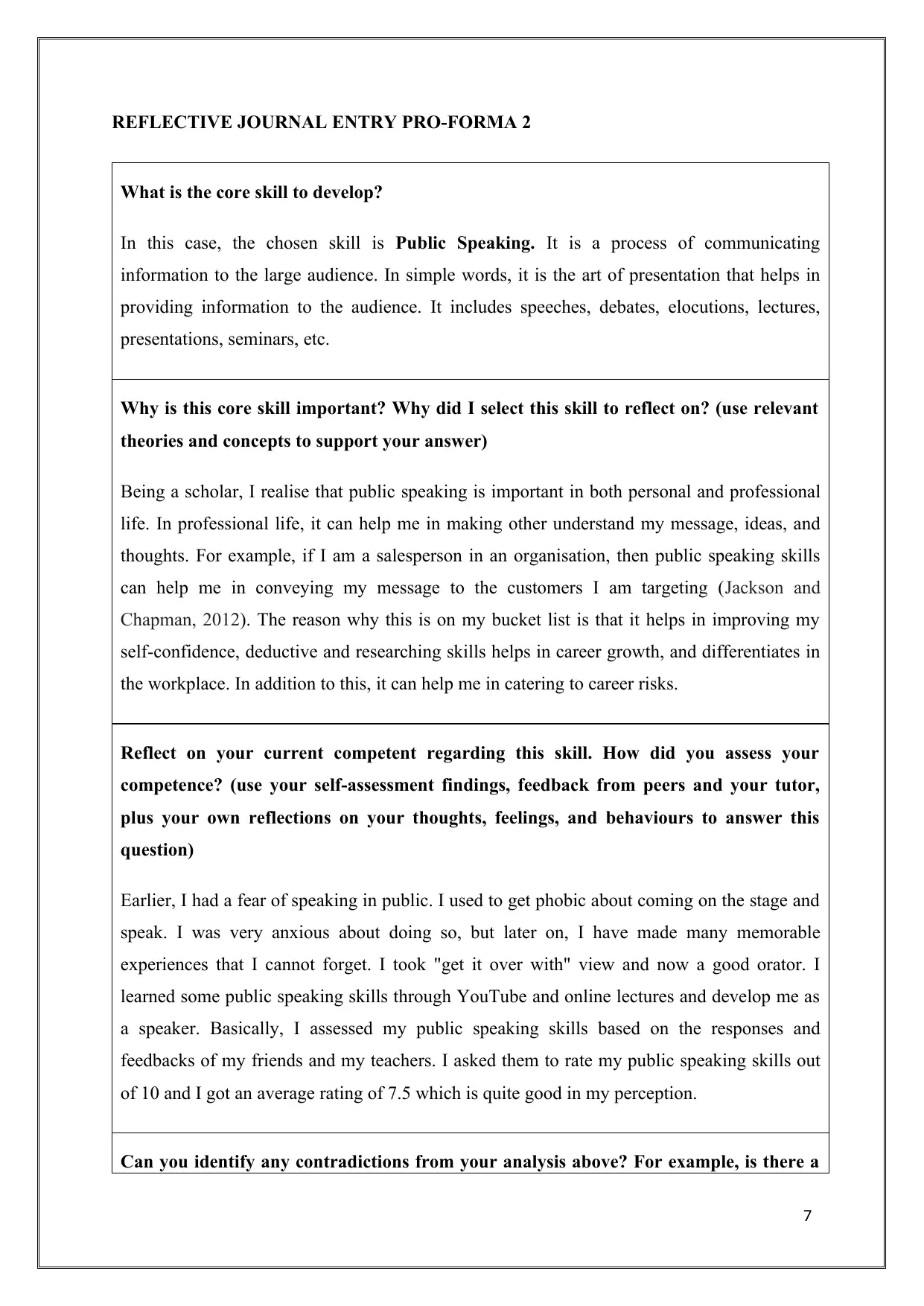
REFLECTIVE JOURNAL ENTRY PRO-FORMA 2
What is the core skill to develop?
In this case, the chosen skill is Public Speaking. It is a process of communicating
information to the large audience. In simple words, it is the art of presentation that helps in
providing information to the audience. It includes speeches, debates, elocutions, lectures,
presentations, seminars, etc.
Why is this core skill important? Why did I select this skill to reflect on? (use relevant
theories and concepts to support your answer)
Being a scholar, I realise that public speaking is important in both personal and professional
life. In professional life, it can help me in making other understand my message, ideas, and
thoughts. For example, if I am a salesperson in an organisation, then public speaking skills
can help me in conveying my message to the customers I am targeting (Jackson and
Chapman, 2012). The reason why this is on my bucket list is that it helps in improving my
self-confidence, deductive and researching skills helps in career growth, and differentiates in
the workplace. In addition to this, it can help me in catering to career risks.
Reflect on your current competent regarding this skill. How did you assess your
competence? (use your self-assessment findings, feedback from peers and your tutor,
plus your own reflections on your thoughts, feelings, and behaviours to answer this
question)
Earlier, I had a fear of speaking in public. I used to get phobic about coming on the stage and
speak. I was very anxious about doing so, but later on, I have made many memorable
experiences that I cannot forget. I took "get it over with" view and now a good orator. I
learned some public speaking skills through YouTube and online lectures and develop me as
a speaker. Basically, I assessed my public speaking skills based on the responses and
feedbacks of my friends and my teachers. I asked them to rate my public speaking skills out
of 10 and I got an average rating of 7.5 which is quite good in my perception.
Can you identify any contradictions from your analysis above? For example, is there a
7
What is the core skill to develop?
In this case, the chosen skill is Public Speaking. It is a process of communicating
information to the large audience. In simple words, it is the art of presentation that helps in
providing information to the audience. It includes speeches, debates, elocutions, lectures,
presentations, seminars, etc.
Why is this core skill important? Why did I select this skill to reflect on? (use relevant
theories and concepts to support your answer)
Being a scholar, I realise that public speaking is important in both personal and professional
life. In professional life, it can help me in making other understand my message, ideas, and
thoughts. For example, if I am a salesperson in an organisation, then public speaking skills
can help me in conveying my message to the customers I am targeting (Jackson and
Chapman, 2012). The reason why this is on my bucket list is that it helps in improving my
self-confidence, deductive and researching skills helps in career growth, and differentiates in
the workplace. In addition to this, it can help me in catering to career risks.
Reflect on your current competent regarding this skill. How did you assess your
competence? (use your self-assessment findings, feedback from peers and your tutor,
plus your own reflections on your thoughts, feelings, and behaviours to answer this
question)
Earlier, I had a fear of speaking in public. I used to get phobic about coming on the stage and
speak. I was very anxious about doing so, but later on, I have made many memorable
experiences that I cannot forget. I took "get it over with" view and now a good orator. I
learned some public speaking skills through YouTube and online lectures and develop me as
a speaker. Basically, I assessed my public speaking skills based on the responses and
feedbacks of my friends and my teachers. I asked them to rate my public speaking skills out
of 10 and I got an average rating of 7.5 which is quite good in my perception.
Can you identify any contradictions from your analysis above? For example, is there a
7
Paraphrase This Document
Need a fresh take? Get an instant paraphrase of this document with our AI Paraphraser
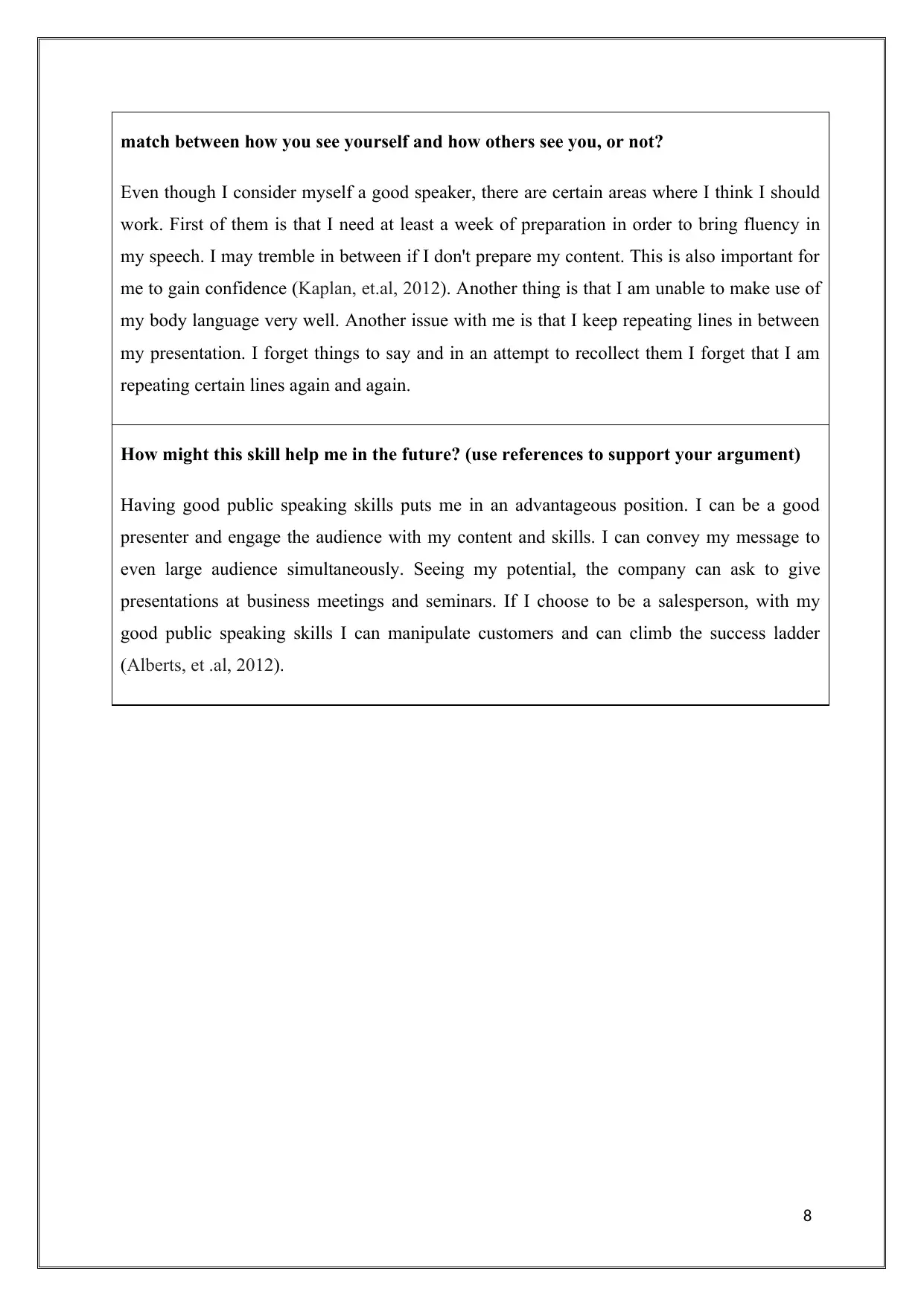
match between how you see yourself and how others see you, or not?
Even though I consider myself a good speaker, there are certain areas where I think I should
work. First of them is that I need at least a week of preparation in order to bring fluency in
my speech. I may tremble in between if I don't prepare my content. This is also important for
me to gain confidence (Kaplan, et.al, 2012). Another thing is that I am unable to make use of
my body language very well. Another issue with me is that I keep repeating lines in between
my presentation. I forget things to say and in an attempt to recollect them I forget that I am
repeating certain lines again and again.
How might this skill help me in the future? (use references to support your argument)
Having good public speaking skills puts me in an advantageous position. I can be a good
presenter and engage the audience with my content and skills. I can convey my message to
even large audience simultaneously. Seeing my potential, the company can ask to give
presentations at business meetings and seminars. If I choose to be a salesperson, with my
good public speaking skills I can manipulate customers and can climb the success ladder
(Alberts, et .al, 2012).
8
Even though I consider myself a good speaker, there are certain areas where I think I should
work. First of them is that I need at least a week of preparation in order to bring fluency in
my speech. I may tremble in between if I don't prepare my content. This is also important for
me to gain confidence (Kaplan, et.al, 2012). Another thing is that I am unable to make use of
my body language very well. Another issue with me is that I keep repeating lines in between
my presentation. I forget things to say and in an attempt to recollect them I forget that I am
repeating certain lines again and again.
How might this skill help me in the future? (use references to support your argument)
Having good public speaking skills puts me in an advantageous position. I can be a good
presenter and engage the audience with my content and skills. I can convey my message to
even large audience simultaneously. Seeing my potential, the company can ask to give
presentations at business meetings and seminars. If I choose to be a salesperson, with my
good public speaking skills I can manipulate customers and can climb the success ladder
(Alberts, et .al, 2012).
8
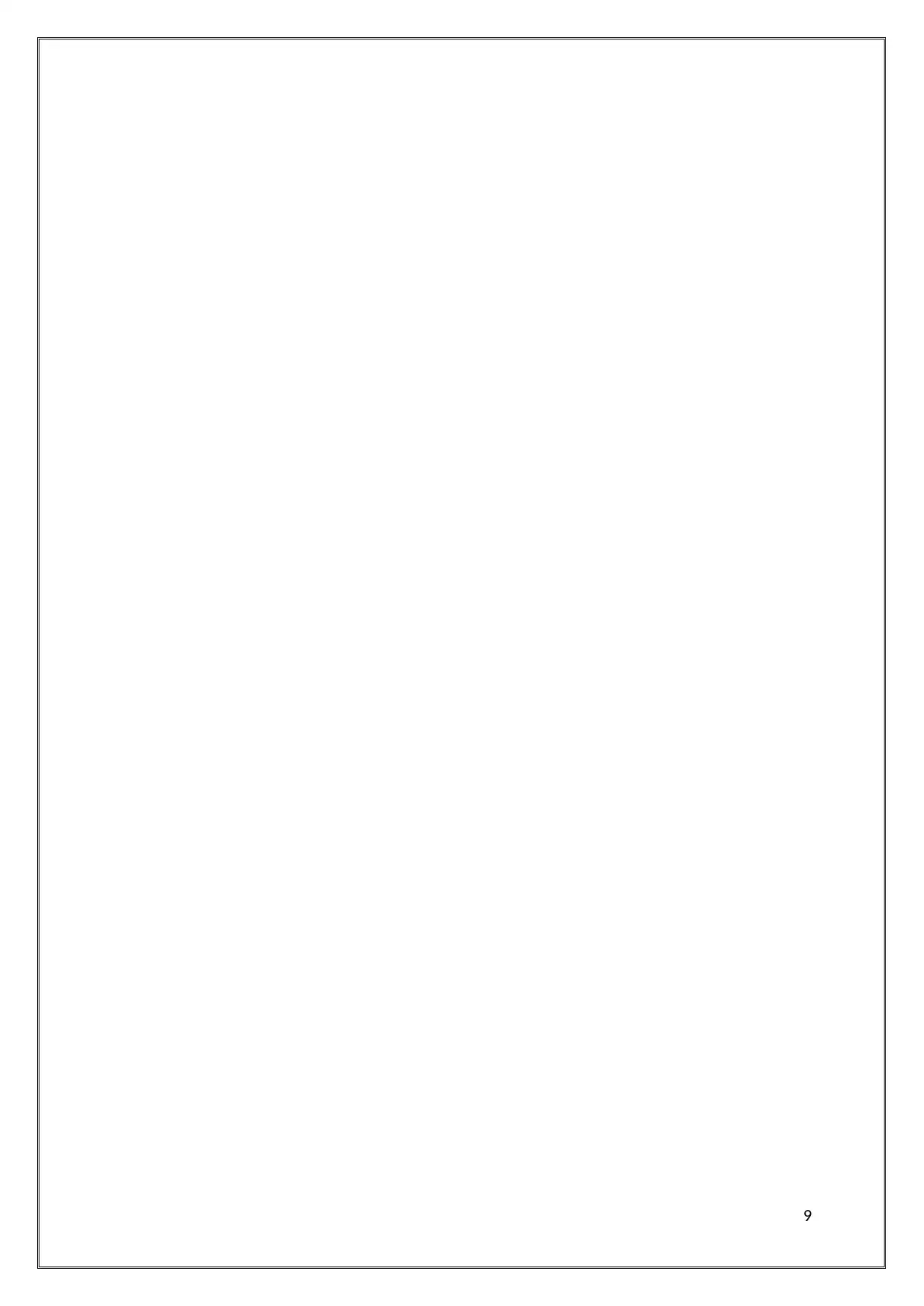
9
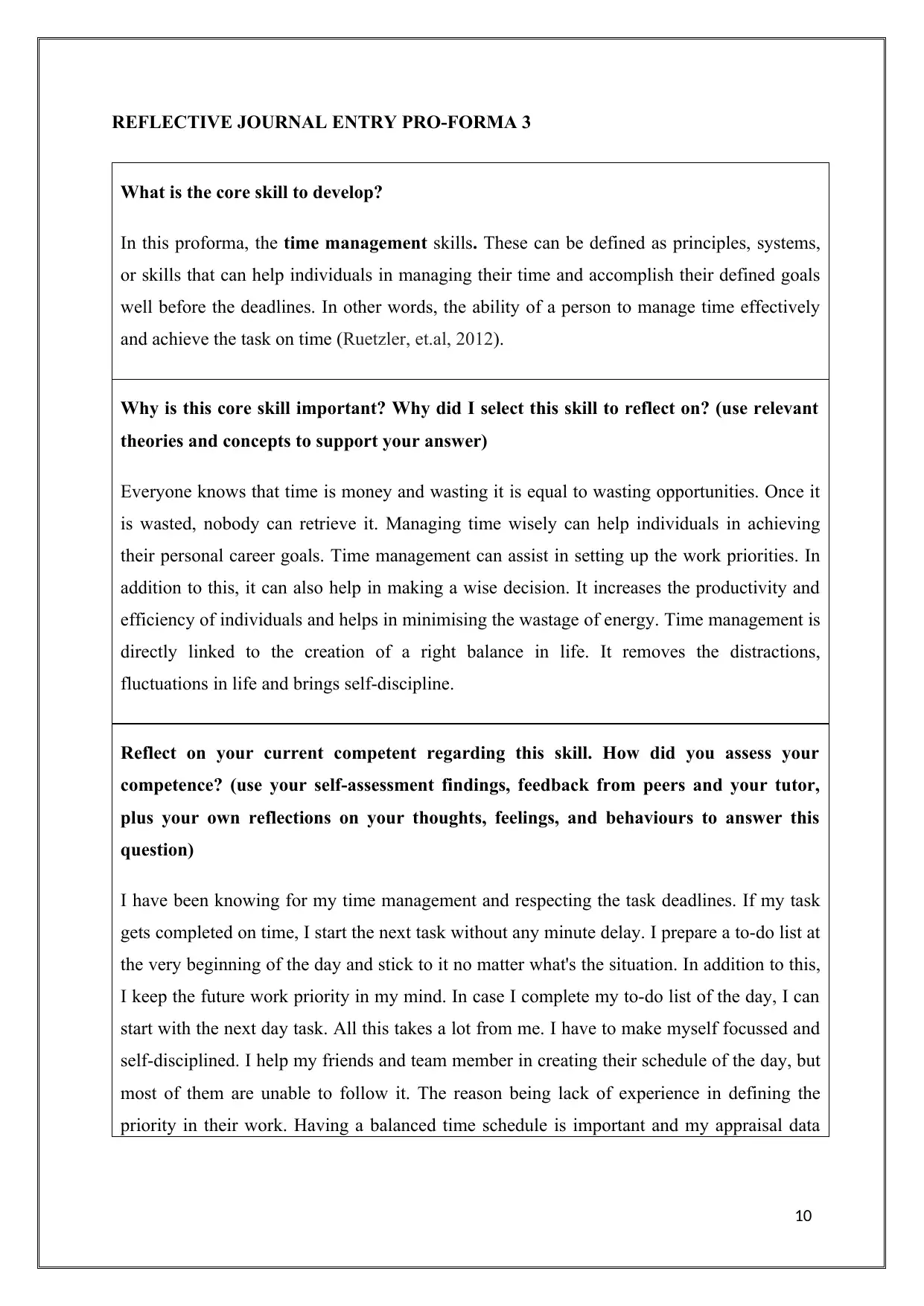
REFLECTIVE JOURNAL ENTRY PRO-FORMA 3
What is the core skill to develop?
In this proforma, the time management skills. These can be defined as principles, systems,
or skills that can help individuals in managing their time and accomplish their defined goals
well before the deadlines. In other words, the ability of a person to manage time effectively
and achieve the task on time (Ruetzler, et.al, 2012).
Why is this core skill important? Why did I select this skill to reflect on? (use relevant
theories and concepts to support your answer)
Everyone knows that time is money and wasting it is equal to wasting opportunities. Once it
is wasted, nobody can retrieve it. Managing time wisely can help individuals in achieving
their personal career goals. Time management can assist in setting up the work priorities. In
addition to this, it can also help in making a wise decision. It increases the productivity and
efficiency of individuals and helps in minimising the wastage of energy. Time management is
directly linked to the creation of a right balance in life. It removes the distractions,
fluctuations in life and brings self-discipline.
Reflect on your current competent regarding this skill. How did you assess your
competence? (use your self-assessment findings, feedback from peers and your tutor,
plus your own reflections on your thoughts, feelings, and behaviours to answer this
question)
I have been knowing for my time management and respecting the task deadlines. If my task
gets completed on time, I start the next task without any minute delay. I prepare a to-do list at
the very beginning of the day and stick to it no matter what's the situation. In addition to this,
I keep the future work priority in my mind. In case I complete my to-do list of the day, I can
start with the next day task. All this takes a lot from me. I have to make myself focussed and
self-disciplined. I help my friends and team member in creating their schedule of the day, but
most of them are unable to follow it. The reason being lack of experience in defining the
priority in their work. Having a balanced time schedule is important and my appraisal data
10
What is the core skill to develop?
In this proforma, the time management skills. These can be defined as principles, systems,
or skills that can help individuals in managing their time and accomplish their defined goals
well before the deadlines. In other words, the ability of a person to manage time effectively
and achieve the task on time (Ruetzler, et.al, 2012).
Why is this core skill important? Why did I select this skill to reflect on? (use relevant
theories and concepts to support your answer)
Everyone knows that time is money and wasting it is equal to wasting opportunities. Once it
is wasted, nobody can retrieve it. Managing time wisely can help individuals in achieving
their personal career goals. Time management can assist in setting up the work priorities. In
addition to this, it can also help in making a wise decision. It increases the productivity and
efficiency of individuals and helps in minimising the wastage of energy. Time management is
directly linked to the creation of a right balance in life. It removes the distractions,
fluctuations in life and brings self-discipline.
Reflect on your current competent regarding this skill. How did you assess your
competence? (use your self-assessment findings, feedback from peers and your tutor,
plus your own reflections on your thoughts, feelings, and behaviours to answer this
question)
I have been knowing for my time management and respecting the task deadlines. If my task
gets completed on time, I start the next task without any minute delay. I prepare a to-do list at
the very beginning of the day and stick to it no matter what's the situation. In addition to this,
I keep the future work priority in my mind. In case I complete my to-do list of the day, I can
start with the next day task. All this takes a lot from me. I have to make myself focussed and
self-disciplined. I help my friends and team member in creating their schedule of the day, but
most of them are unable to follow it. The reason being lack of experience in defining the
priority in their work. Having a balanced time schedule is important and my appraisal data
10
Secure Best Marks with AI Grader
Need help grading? Try our AI Grader for instant feedback on your assignments.
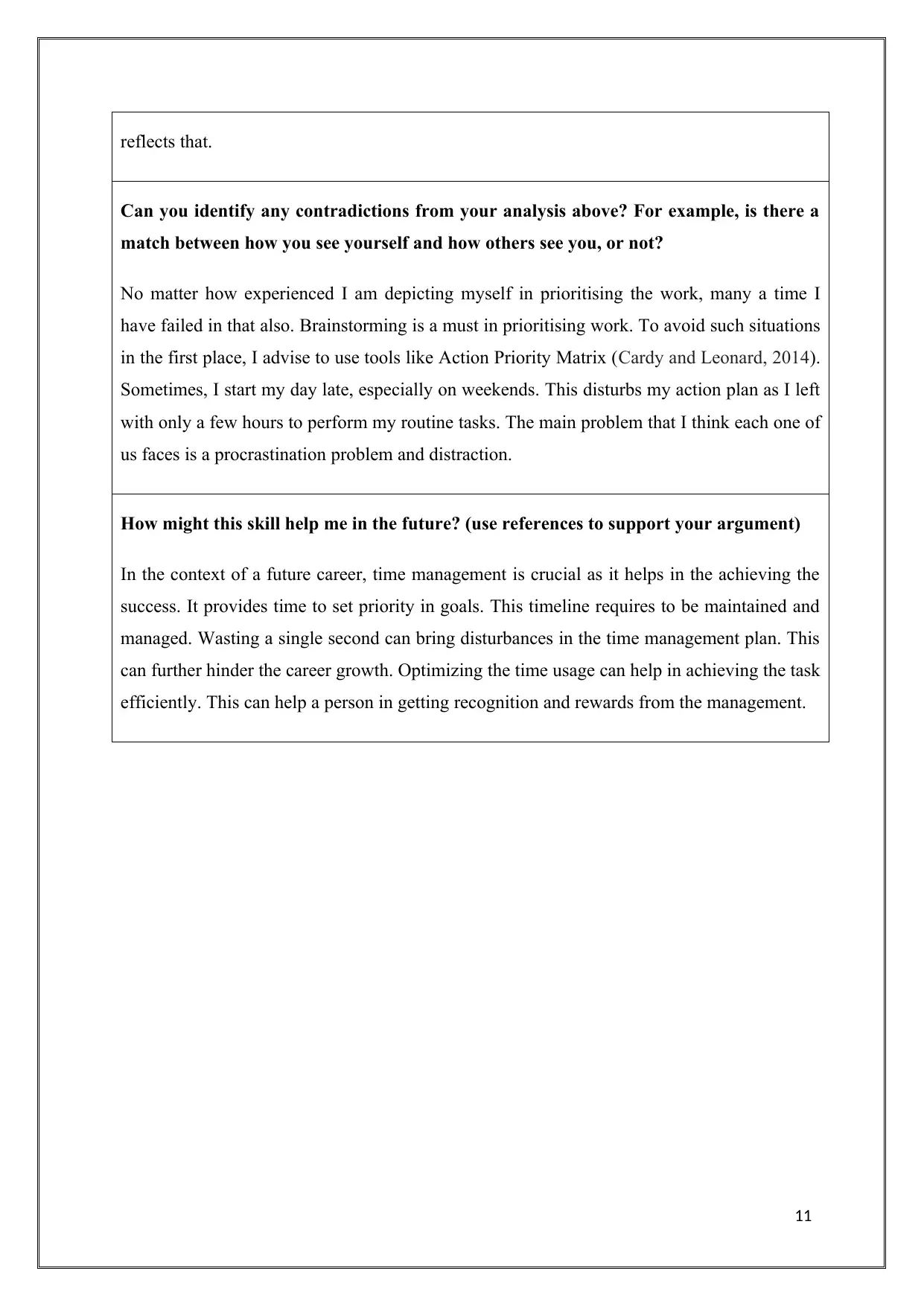
reflects that.
Can you identify any contradictions from your analysis above? For example, is there a
match between how you see yourself and how others see you, or not?
No matter how experienced I am depicting myself in prioritising the work, many a time I
have failed in that also. Brainstorming is a must in prioritising work. To avoid such situations
in the first place, I advise to use tools like Action Priority Matrix (Cardy and Leonard, 2014).
Sometimes, I start my day late, especially on weekends. This disturbs my action plan as I left
with only a few hours to perform my routine tasks. The main problem that I think each one of
us faces is a procrastination problem and distraction.
How might this skill help me in the future? (use references to support your argument)
In the context of a future career, time management is crucial as it helps in the achieving the
success. It provides time to set priority in goals. This timeline requires to be maintained and
managed. Wasting a single second can bring disturbances in the time management plan. This
can further hinder the career growth. Optimizing the time usage can help in achieving the task
efficiently. This can help a person in getting recognition and rewards from the management.
11
Can you identify any contradictions from your analysis above? For example, is there a
match between how you see yourself and how others see you, or not?
No matter how experienced I am depicting myself in prioritising the work, many a time I
have failed in that also. Brainstorming is a must in prioritising work. To avoid such situations
in the first place, I advise to use tools like Action Priority Matrix (Cardy and Leonard, 2014).
Sometimes, I start my day late, especially on weekends. This disturbs my action plan as I left
with only a few hours to perform my routine tasks. The main problem that I think each one of
us faces is a procrastination problem and distraction.
How might this skill help me in the future? (use references to support your argument)
In the context of a future career, time management is crucial as it helps in the achieving the
success. It provides time to set priority in goals. This timeline requires to be maintained and
managed. Wasting a single second can bring disturbances in the time management plan. This
can further hinder the career growth. Optimizing the time usage can help in achieving the task
efficiently. This can help a person in getting recognition and rewards from the management.
11
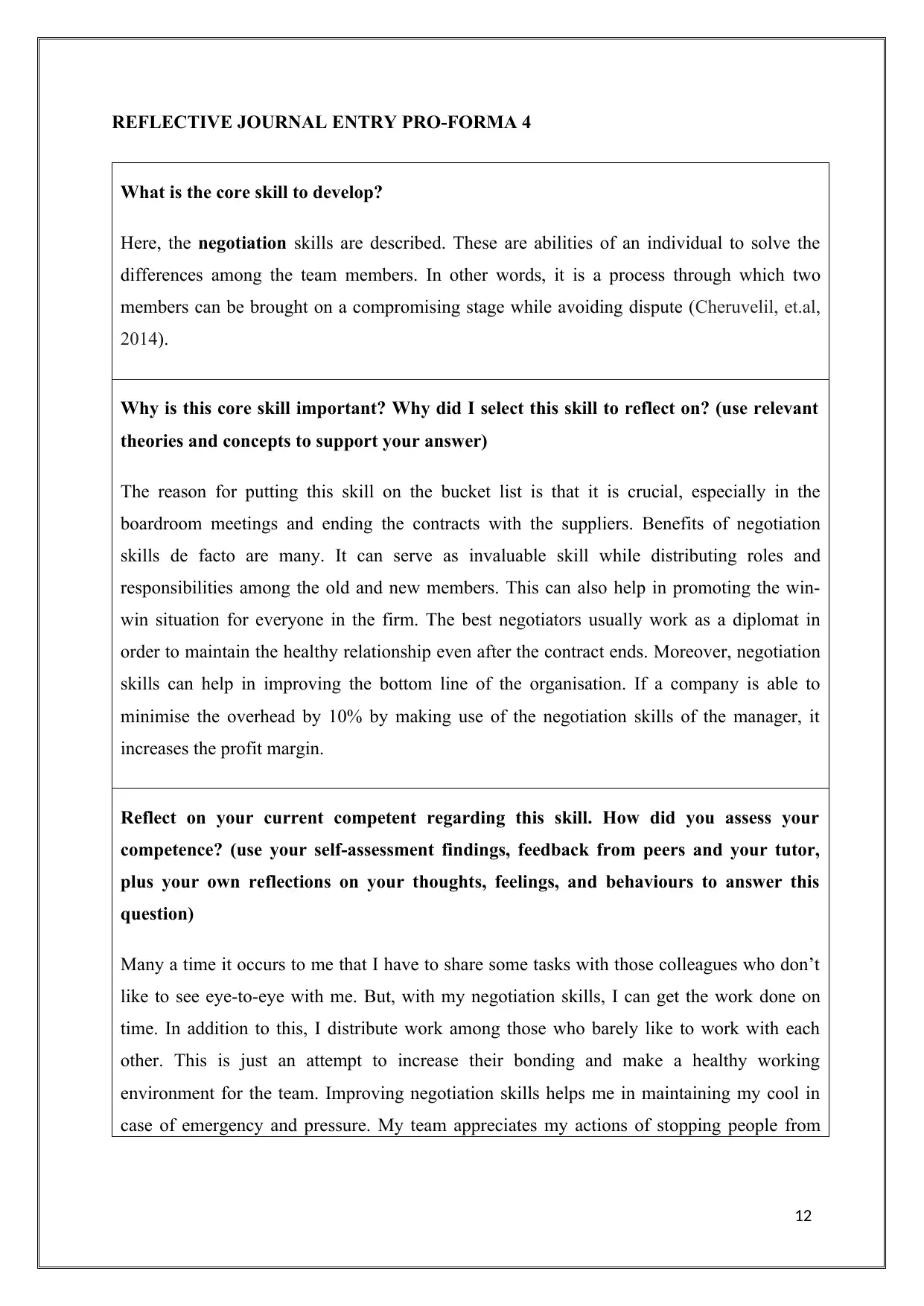
REFLECTIVE JOURNAL ENTRY PRO-FORMA 4
What is the core skill to develop?
Here, the negotiation skills are described. These are abilities of an individual to solve the
differences among the team members. In other words, it is a process through which two
members can be brought on a compromising stage while avoiding dispute (Cheruvelil, et.al,
2014).
Why is this core skill important? Why did I select this skill to reflect on? (use relevant
theories and concepts to support your answer)
The reason for putting this skill on the bucket list is that it is crucial, especially in the
boardroom meetings and ending the contracts with the suppliers. Benefits of negotiation
skills de facto are many. It can serve as invaluable skill while distributing roles and
responsibilities among the old and new members. This can also help in promoting the win-
win situation for everyone in the firm. The best negotiators usually work as a diplomat in
order to maintain the healthy relationship even after the contract ends. Moreover, negotiation
skills can help in improving the bottom line of the organisation. If a company is able to
minimise the overhead by 10% by making use of the negotiation skills of the manager, it
increases the profit margin.
Reflect on your current competent regarding this skill. How did you assess your
competence? (use your self-assessment findings, feedback from peers and your tutor,
plus your own reflections on your thoughts, feelings, and behaviours to answer this
question)
Many a time it occurs to me that I have to share some tasks with those colleagues who don’t
like to see eye-to-eye with me. But, with my negotiation skills, I can get the work done on
time. In addition to this, I distribute work among those who barely like to work with each
other. This is just an attempt to increase their bonding and make a healthy working
environment for the team. Improving negotiation skills helps me in maintaining my cool in
case of emergency and pressure. My team appreciates my actions of stopping people from
12
What is the core skill to develop?
Here, the negotiation skills are described. These are abilities of an individual to solve the
differences among the team members. In other words, it is a process through which two
members can be brought on a compromising stage while avoiding dispute (Cheruvelil, et.al,
2014).
Why is this core skill important? Why did I select this skill to reflect on? (use relevant
theories and concepts to support your answer)
The reason for putting this skill on the bucket list is that it is crucial, especially in the
boardroom meetings and ending the contracts with the suppliers. Benefits of negotiation
skills de facto are many. It can serve as invaluable skill while distributing roles and
responsibilities among the old and new members. This can also help in promoting the win-
win situation for everyone in the firm. The best negotiators usually work as a diplomat in
order to maintain the healthy relationship even after the contract ends. Moreover, negotiation
skills can help in improving the bottom line of the organisation. If a company is able to
minimise the overhead by 10% by making use of the negotiation skills of the manager, it
increases the profit margin.
Reflect on your current competent regarding this skill. How did you assess your
competence? (use your self-assessment findings, feedback from peers and your tutor,
plus your own reflections on your thoughts, feelings, and behaviours to answer this
question)
Many a time it occurs to me that I have to share some tasks with those colleagues who don’t
like to see eye-to-eye with me. But, with my negotiation skills, I can get the work done on
time. In addition to this, I distribute work among those who barely like to work with each
other. This is just an attempt to increase their bonding and make a healthy working
environment for the team. Improving negotiation skills helps me in maintaining my cool in
case of emergency and pressure. My team appreciates my actions of stopping people from
12
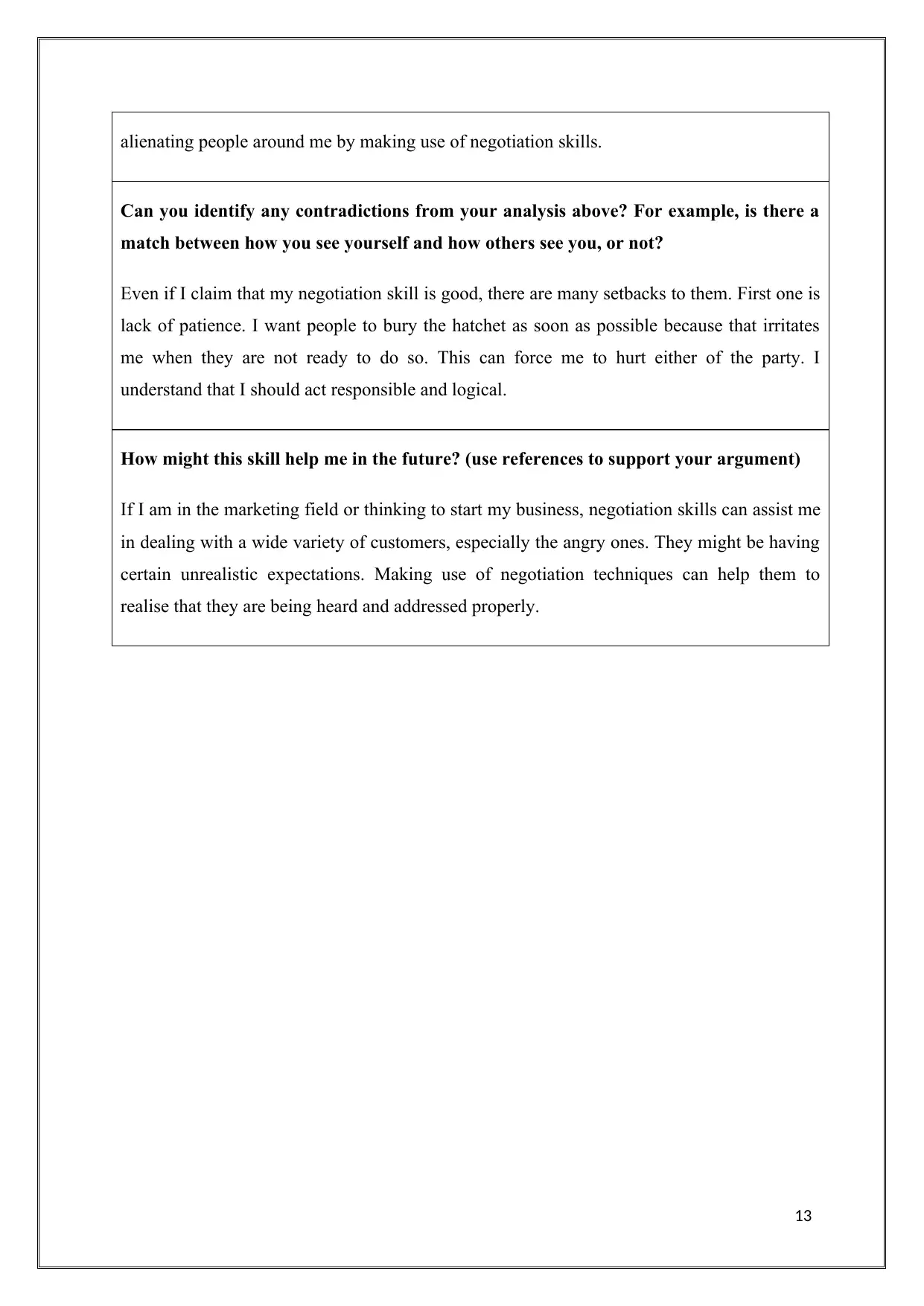
alienating people around me by making use of negotiation skills.
Can you identify any contradictions from your analysis above? For example, is there a
match between how you see yourself and how others see you, or not?
Even if I claim that my negotiation skill is good, there are many setbacks to them. First one is
lack of patience. I want people to bury the hatchet as soon as possible because that irritates
me when they are not ready to do so. This can force me to hurt either of the party. I
understand that I should act responsible and logical.
How might this skill help me in the future? (use references to support your argument)
If I am in the marketing field or thinking to start my business, negotiation skills can assist me
in dealing with a wide variety of customers, especially the angry ones. They might be having
certain unrealistic expectations. Making use of negotiation techniques can help them to
realise that they are being heard and addressed properly.
13
Can you identify any contradictions from your analysis above? For example, is there a
match between how you see yourself and how others see you, or not?
Even if I claim that my negotiation skill is good, there are many setbacks to them. First one is
lack of patience. I want people to bury the hatchet as soon as possible because that irritates
me when they are not ready to do so. This can force me to hurt either of the party. I
understand that I should act responsible and logical.
How might this skill help me in the future? (use references to support your argument)
If I am in the marketing field or thinking to start my business, negotiation skills can assist me
in dealing with a wide variety of customers, especially the angry ones. They might be having
certain unrealistic expectations. Making use of negotiation techniques can help them to
realise that they are being heard and addressed properly.
13
Paraphrase This Document
Need a fresh take? Get an instant paraphrase of this document with our AI Paraphraser
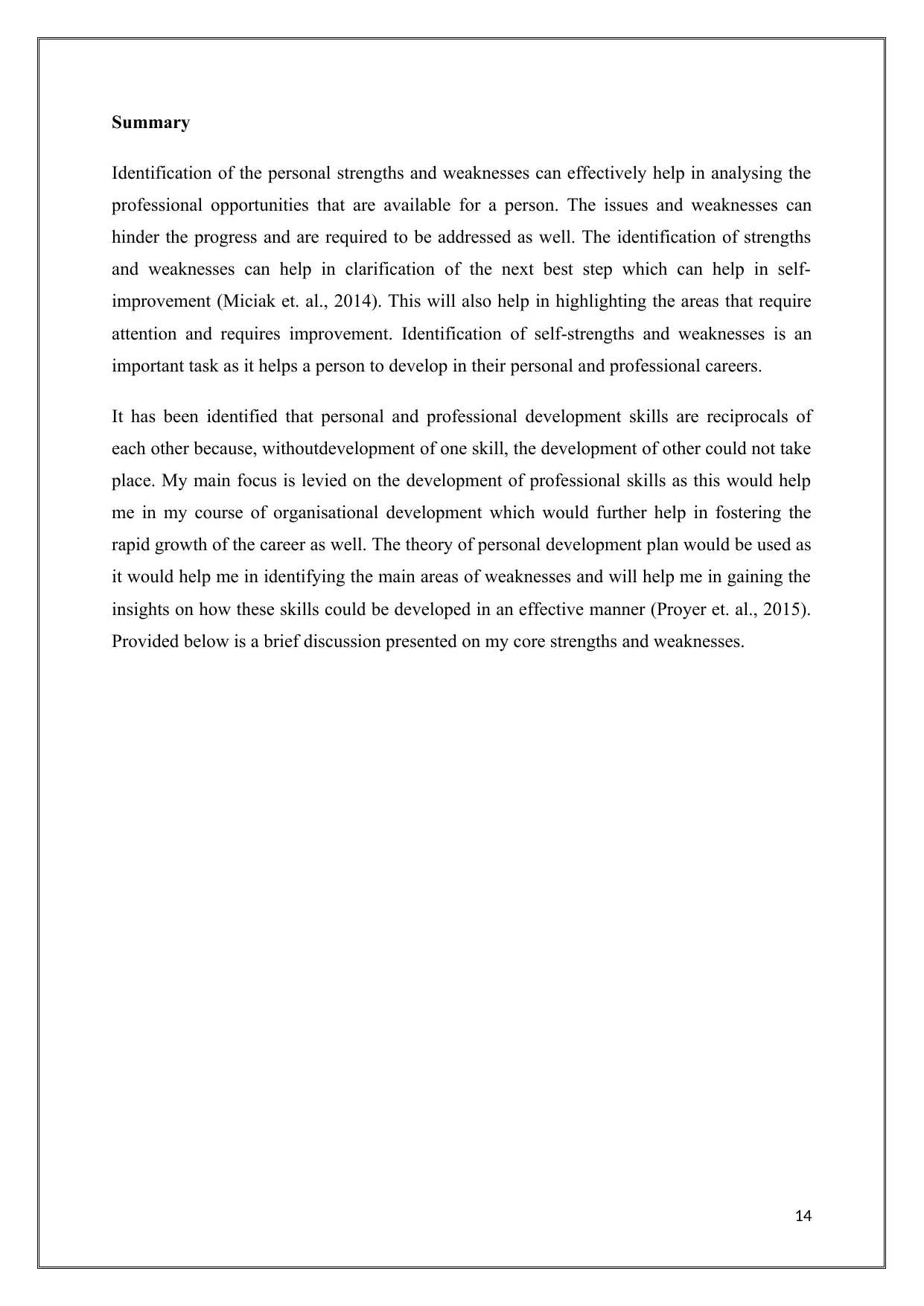
Summary
Identification of the personal strengths and weaknesses can effectively help in analysing the
professional opportunities that are available for a person. The issues and weaknesses can
hinder the progress and are required to be addressed as well. The identification of strengths
and weaknesses can help in clarification of the next best step which can help in self-
improvement (Miciak et. al., 2014). This will also help in highlighting the areas that require
attention and requires improvement. Identification of self-strengths and weaknesses is an
important task as it helps a person to develop in their personal and professional careers.
It has been identified that personal and professional development skills are reciprocals of
each other because, withoutdevelopment of one skill, the development of other could not take
place. My main focus is levied on the development of professional skills as this would help
me in my course of organisational development which would further help in fostering the
rapid growth of the career as well. The theory of personal development plan would be used as
it would help me in identifying the main areas of weaknesses and will help me in gaining the
insights on how these skills could be developed in an effective manner (Proyer et. al., 2015).
Provided below is a brief discussion presented on my core strengths and weaknesses.
14
Identification of the personal strengths and weaknesses can effectively help in analysing the
professional opportunities that are available for a person. The issues and weaknesses can
hinder the progress and are required to be addressed as well. The identification of strengths
and weaknesses can help in clarification of the next best step which can help in self-
improvement (Miciak et. al., 2014). This will also help in highlighting the areas that require
attention and requires improvement. Identification of self-strengths and weaknesses is an
important task as it helps a person to develop in their personal and professional careers.
It has been identified that personal and professional development skills are reciprocals of
each other because, withoutdevelopment of one skill, the development of other could not take
place. My main focus is levied on the development of professional skills as this would help
me in my course of organisational development which would further help in fostering the
rapid growth of the career as well. The theory of personal development plan would be used as
it would help me in identifying the main areas of weaknesses and will help me in gaining the
insights on how these skills could be developed in an effective manner (Proyer et. al., 2015).
Provided below is a brief discussion presented on my core strengths and weaknesses.
14
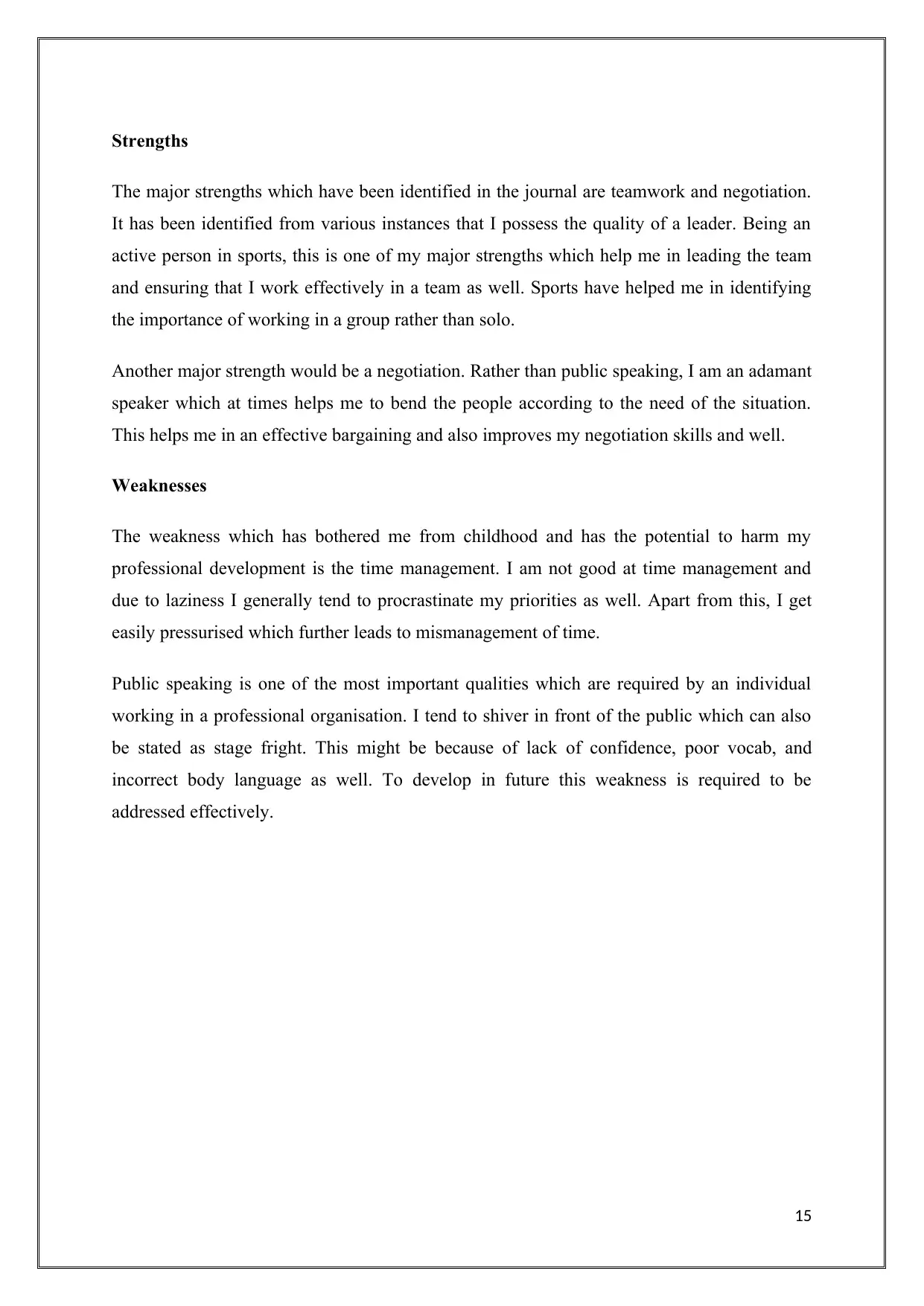
Strengths
The major strengths which have been identified in the journal are teamwork and negotiation.
It has been identified from various instances that I possess the quality of a leader. Being an
active person in sports, this is one of my major strengths which help me in leading the team
and ensuring that I work effectively in a team as well. Sports have helped me in identifying
the importance of working in a group rather than solo.
Another major strength would be a negotiation. Rather than public speaking, I am an adamant
speaker which at times helps me to bend the people according to the need of the situation.
This helps me in an effective bargaining and also improves my negotiation skills and well.
Weaknesses
The weakness which has bothered me from childhood and has the potential to harm my
professional development is the time management. I am not good at time management and
due to laziness I generally tend to procrastinate my priorities as well. Apart from this, I get
easily pressurised which further leads to mismanagement of time.
Public speaking is one of the most important qualities which are required by an individual
working in a professional organisation. I tend to shiver in front of the public which can also
be stated as stage fright. This might be because of lack of confidence, poor vocab, and
incorrect body language as well. To develop in future this weakness is required to be
addressed effectively.
15
The major strengths which have been identified in the journal are teamwork and negotiation.
It has been identified from various instances that I possess the quality of a leader. Being an
active person in sports, this is one of my major strengths which help me in leading the team
and ensuring that I work effectively in a team as well. Sports have helped me in identifying
the importance of working in a group rather than solo.
Another major strength would be a negotiation. Rather than public speaking, I am an adamant
speaker which at times helps me to bend the people according to the need of the situation.
This helps me in an effective bargaining and also improves my negotiation skills and well.
Weaknesses
The weakness which has bothered me from childhood and has the potential to harm my
professional development is the time management. I am not good at time management and
due to laziness I generally tend to procrastinate my priorities as well. Apart from this, I get
easily pressurised which further leads to mismanagement of time.
Public speaking is one of the most important qualities which are required by an individual
working in a professional organisation. I tend to shiver in front of the public which can also
be stated as stage fright. This might be because of lack of confidence, poor vocab, and
incorrect body language as well. To develop in future this weakness is required to be
addressed effectively.
15
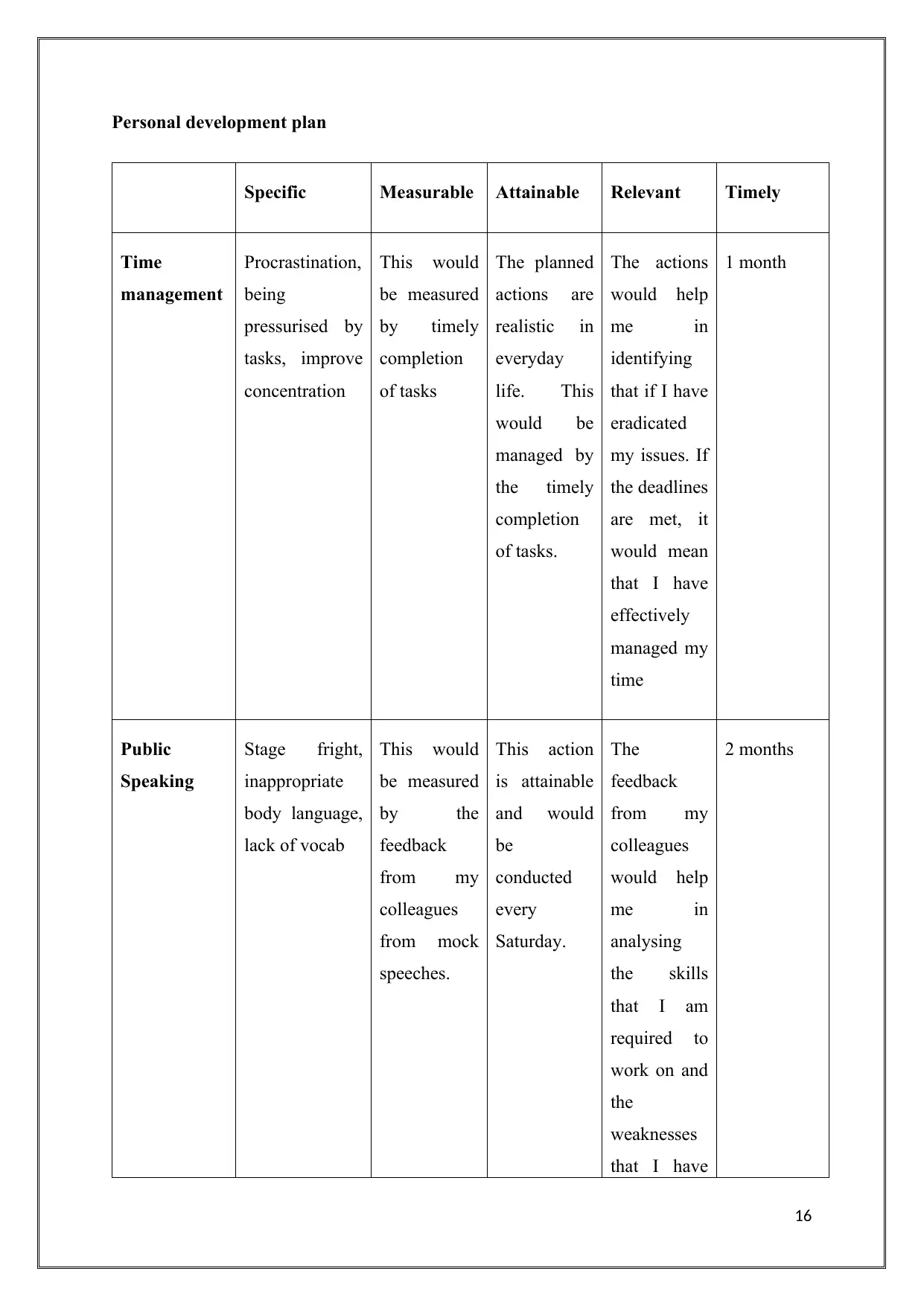
Personal development plan
Specific Measurable Attainable Relevant Timely
Time
management
Procrastination,
being
pressurised by
tasks, improve
concentration
This would
be measured
by timely
completion
of tasks
The planned
actions are
realistic in
everyday
life. This
would be
managed by
the timely
completion
of tasks.
The actions
would help
me in
identifying
that if I have
eradicated
my issues. If
the deadlines
are met, it
would mean
that I have
effectively
managed my
time
1 month
Public
Speaking
Stage fright,
inappropriate
body language,
lack of vocab
This would
be measured
by the
feedback
from my
colleagues
from mock
speeches.
This action
is attainable
and would
be
conducted
every
Saturday.
The
feedback
from my
colleagues
would help
me in
analysing
the skills
that I am
required to
work on and
the
weaknesses
that I have
2 months
16
Specific Measurable Attainable Relevant Timely
Time
management
Procrastination,
being
pressurised by
tasks, improve
concentration
This would
be measured
by timely
completion
of tasks
The planned
actions are
realistic in
everyday
life. This
would be
managed by
the timely
completion
of tasks.
The actions
would help
me in
identifying
that if I have
eradicated
my issues. If
the deadlines
are met, it
would mean
that I have
effectively
managed my
time
1 month
Public
Speaking
Stage fright,
inappropriate
body language,
lack of vocab
This would
be measured
by the
feedback
from my
colleagues
from mock
speeches.
This action
is attainable
and would
be
conducted
every
Saturday.
The
feedback
from my
colleagues
would help
me in
analysing
the skills
that I am
required to
work on and
the
weaknesses
that I have
2 months
16
Secure Best Marks with AI Grader
Need help grading? Try our AI Grader for instant feedback on your assignments.
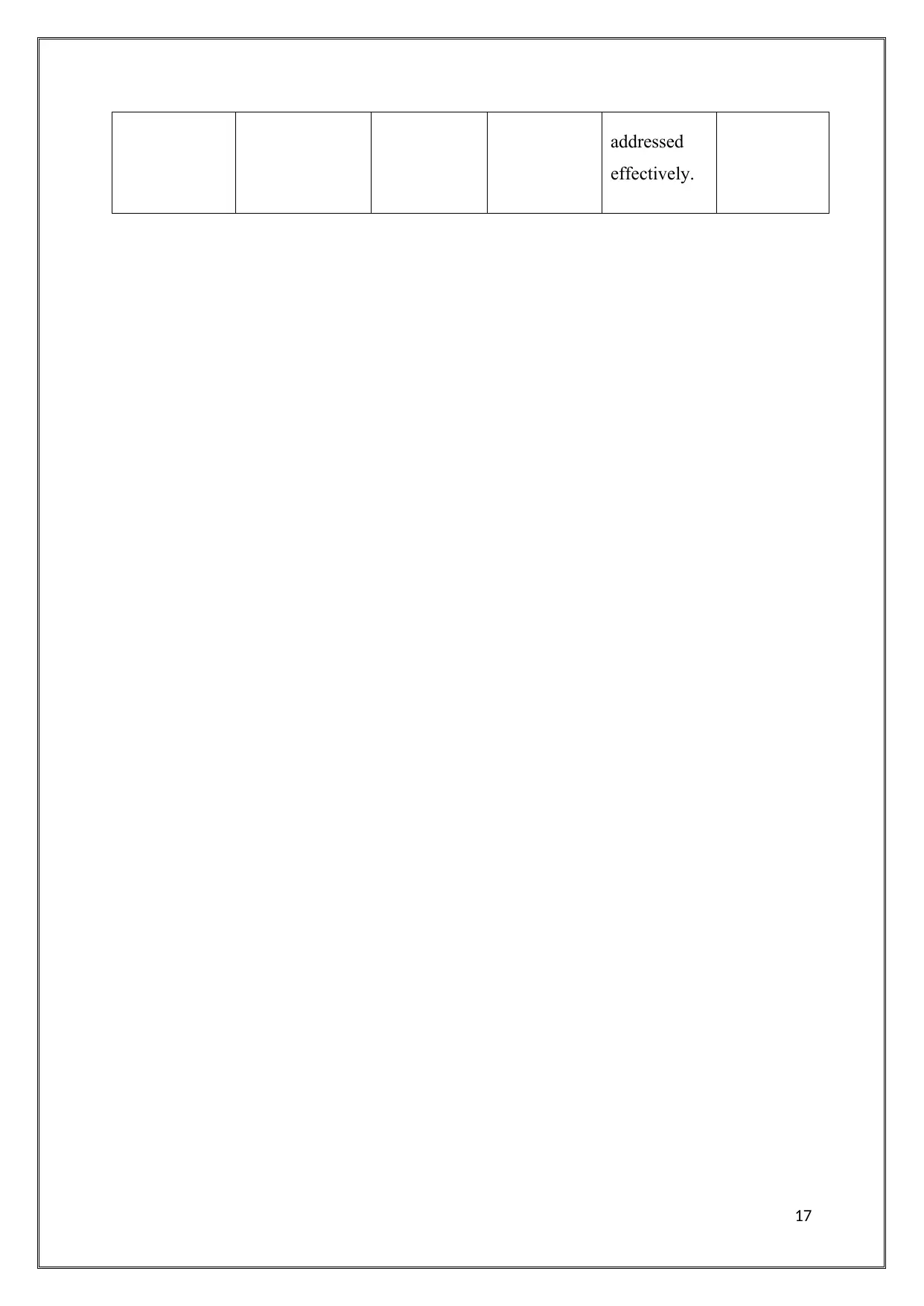
addressed
effectively.
17
effectively.
17
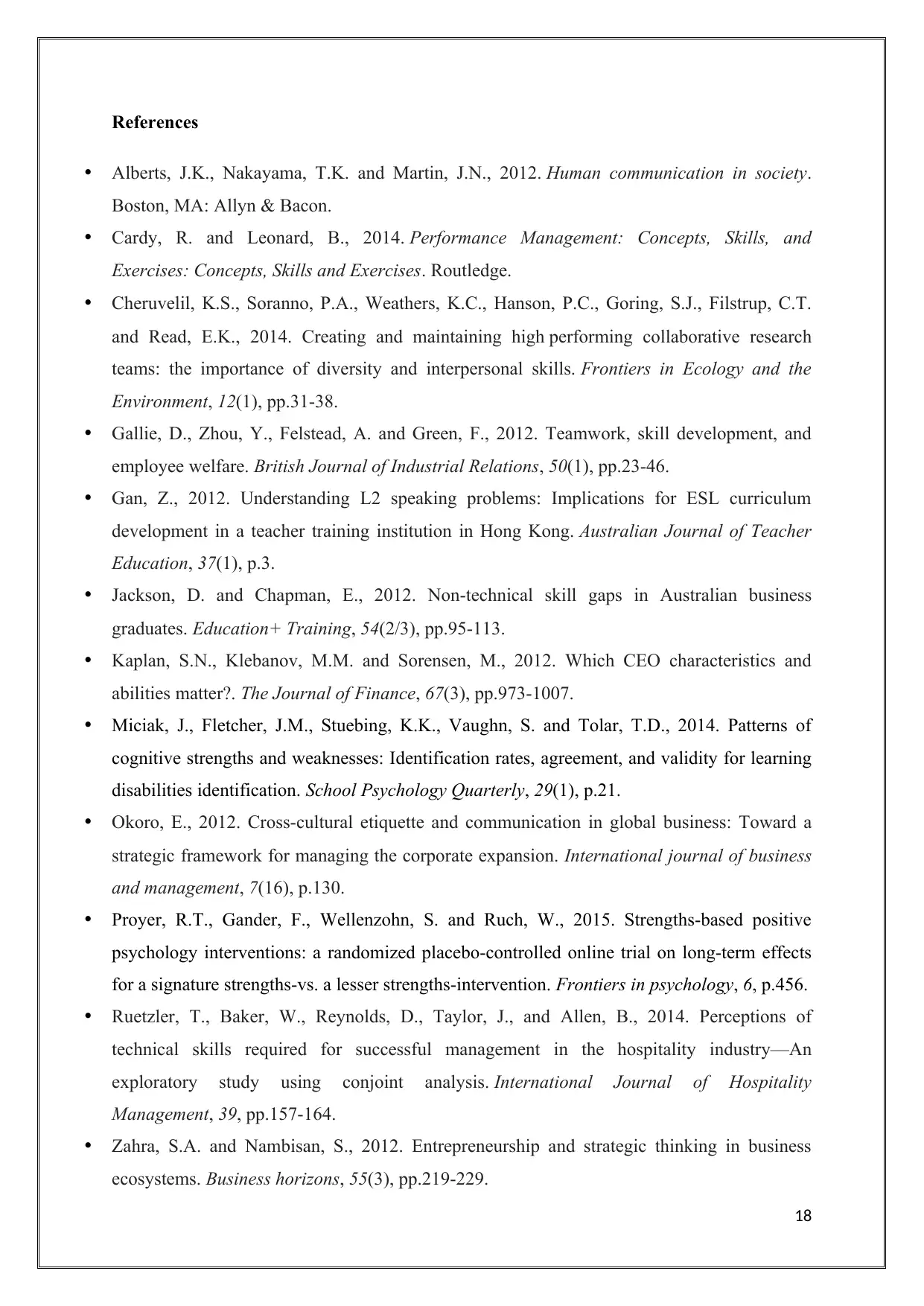
References
Alberts, J.K., Nakayama, T.K. and Martin, J.N., 2012. Human communication in society.
Boston, MA: Allyn & Bacon.
Cardy, R. and Leonard, B., 2014. Performance Management: Concepts, Skills, and
Exercises: Concepts, Skills and Exercises. Routledge.
Cheruvelil, K.S., Soranno, P.A., Weathers, K.C., Hanson, P.C., Goring, S.J., Filstrup, C.T.
and Read, E.K., 2014. Creating and maintaining high‐performing collaborative research
teams: the importance of diversity and interpersonal skills. Frontiers in Ecology and the
Environment, 12(1), pp.31-38.
Gallie, D., Zhou, Y., Felstead, A. and Green, F., 2012. Teamwork, skill development, and
employee welfare. British Journal of Industrial Relations, 50(1), pp.23-46.
Gan, Z., 2012. Understanding L2 speaking problems: Implications for ESL curriculum
development in a teacher training institution in Hong Kong. Australian Journal of Teacher
Education, 37(1), p.3.
Jackson, D. and Chapman, E., 2012. Non-technical skill gaps in Australian business
graduates. Education+ Training, 54(2/3), pp.95-113.
Kaplan, S.N., Klebanov, M.M. and Sorensen, M., 2012. Which CEO characteristics and
abilities matter?. The Journal of Finance, 67(3), pp.973-1007.
Miciak, J., Fletcher, J.M., Stuebing, K.K., Vaughn, S. and Tolar, T.D., 2014. Patterns of
cognitive strengths and weaknesses: Identification rates, agreement, and validity for learning
disabilities identification. School Psychology Quarterly, 29(1), p.21.
Okoro, E., 2012. Cross-cultural etiquette and communication in global business: Toward a
strategic framework for managing the corporate expansion. International journal of business
and management, 7(16), p.130.
Proyer, R.T., Gander, F., Wellenzohn, S. and Ruch, W., 2015. Strengths-based positive
psychology interventions: a randomized placebo-controlled online trial on long-term effects
for a signature strengths-vs. a lesser strengths-intervention. Frontiers in psychology, 6, p.456.
Ruetzler, T., Baker, W., Reynolds, D., Taylor, J., and Allen, B., 2014. Perceptions of
technical skills required for successful management in the hospitality industry—An
exploratory study using conjoint analysis. International Journal of Hospitality
Management, 39, pp.157-164.
Zahra, S.A. and Nambisan, S., 2012. Entrepreneurship and strategic thinking in business
ecosystems. Business horizons, 55(3), pp.219-229.
18
Alberts, J.K., Nakayama, T.K. and Martin, J.N., 2012. Human communication in society.
Boston, MA: Allyn & Bacon.
Cardy, R. and Leonard, B., 2014. Performance Management: Concepts, Skills, and
Exercises: Concepts, Skills and Exercises. Routledge.
Cheruvelil, K.S., Soranno, P.A., Weathers, K.C., Hanson, P.C., Goring, S.J., Filstrup, C.T.
and Read, E.K., 2014. Creating and maintaining high‐performing collaborative research
teams: the importance of diversity and interpersonal skills. Frontiers in Ecology and the
Environment, 12(1), pp.31-38.
Gallie, D., Zhou, Y., Felstead, A. and Green, F., 2012. Teamwork, skill development, and
employee welfare. British Journal of Industrial Relations, 50(1), pp.23-46.
Gan, Z., 2012. Understanding L2 speaking problems: Implications for ESL curriculum
development in a teacher training institution in Hong Kong. Australian Journal of Teacher
Education, 37(1), p.3.
Jackson, D. and Chapman, E., 2012. Non-technical skill gaps in Australian business
graduates. Education+ Training, 54(2/3), pp.95-113.
Kaplan, S.N., Klebanov, M.M. and Sorensen, M., 2012. Which CEO characteristics and
abilities matter?. The Journal of Finance, 67(3), pp.973-1007.
Miciak, J., Fletcher, J.M., Stuebing, K.K., Vaughn, S. and Tolar, T.D., 2014. Patterns of
cognitive strengths and weaknesses: Identification rates, agreement, and validity for learning
disabilities identification. School Psychology Quarterly, 29(1), p.21.
Okoro, E., 2012. Cross-cultural etiquette and communication in global business: Toward a
strategic framework for managing the corporate expansion. International journal of business
and management, 7(16), p.130.
Proyer, R.T., Gander, F., Wellenzohn, S. and Ruch, W., 2015. Strengths-based positive
psychology interventions: a randomized placebo-controlled online trial on long-term effects
for a signature strengths-vs. a lesser strengths-intervention. Frontiers in psychology, 6, p.456.
Ruetzler, T., Baker, W., Reynolds, D., Taylor, J., and Allen, B., 2014. Perceptions of
technical skills required for successful management in the hospitality industry—An
exploratory study using conjoint analysis. International Journal of Hospitality
Management, 39, pp.157-164.
Zahra, S.A. and Nambisan, S., 2012. Entrepreneurship and strategic thinking in business
ecosystems. Business horizons, 55(3), pp.219-229.
18
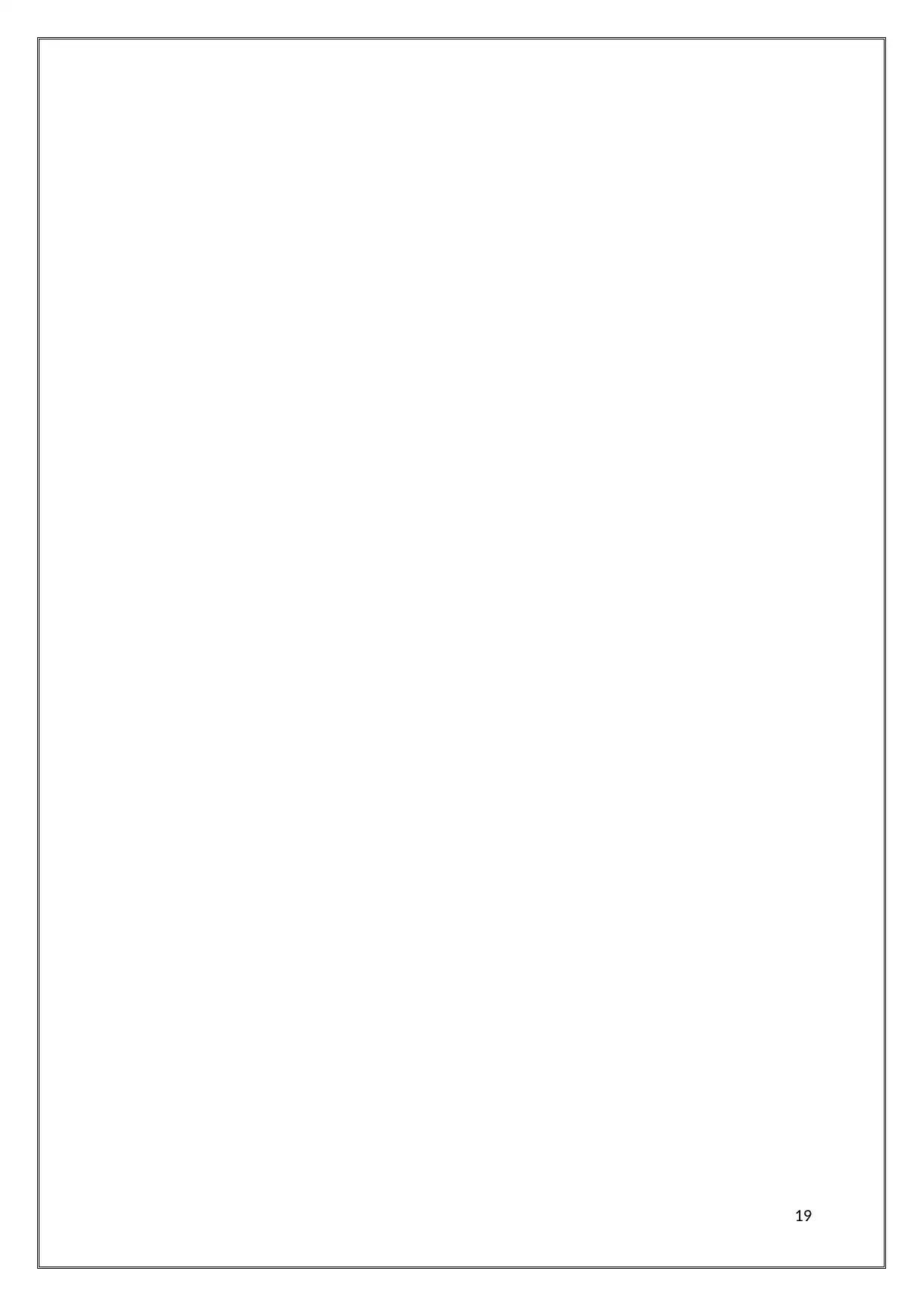
19
1 out of 19
Related Documents
Your All-in-One AI-Powered Toolkit for Academic Success.
+13062052269
info@desklib.com
Available 24*7 on WhatsApp / Email
![[object Object]](/_next/static/media/star-bottom.7253800d.svg)
Unlock your academic potential
© 2024 | Zucol Services PVT LTD | All rights reserved.





